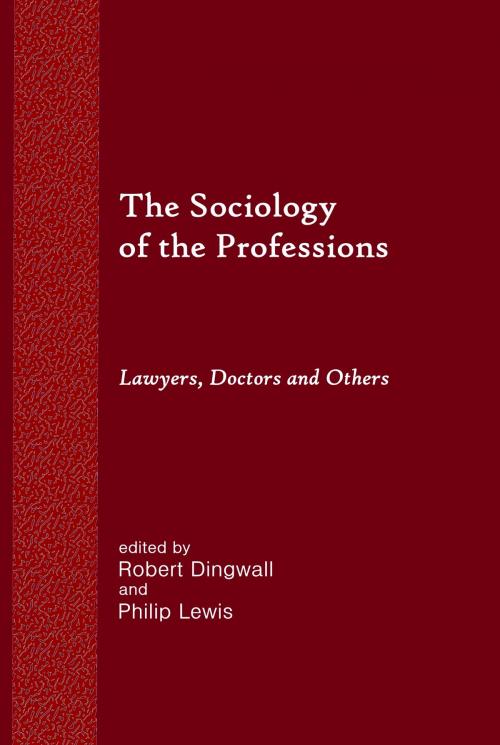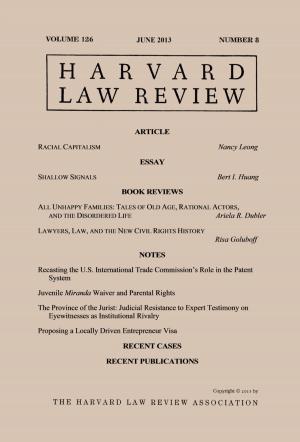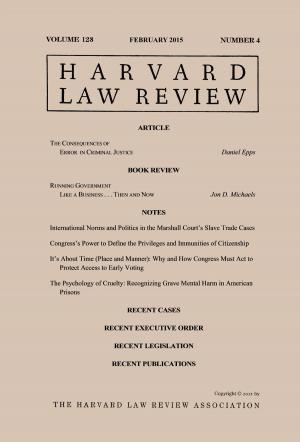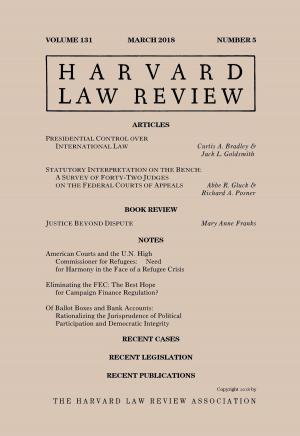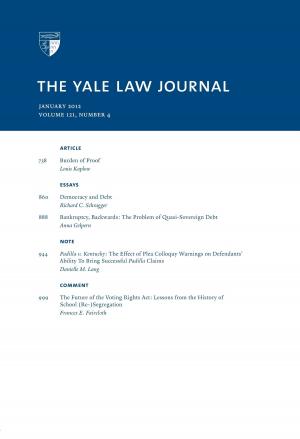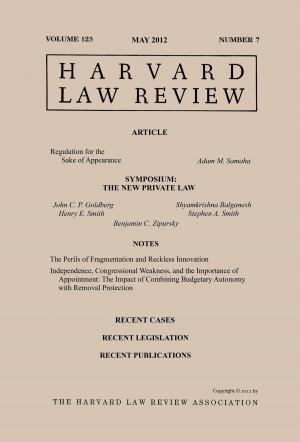The Sociology of the Professions: Lawyers, Doctors and Others
Nonfiction, Reference & Language, Law, Legal Profession, Social & Cultural Studies, Social Science, Sociology| Author: | Robert Dingwall | ISBN: | 9781610272322 |
| Publisher: | Quid Pro, LLC | Publication: | April 8, 2014 |
| Imprint: | Smashwords Edition | Language: | English |
| Author: | Robert Dingwall |
| ISBN: | 9781610272322 |
| Publisher: | Quid Pro, LLC |
| Publication: | April 8, 2014 |
| Imprint: | Smashwords Edition |
| Language: | English |
Robert Dingwall and Philip Lewis’s renowned compilation of diverse studies—written by internationally recognized theorists and empirical researchers into the sociology of the professions—was groundbreaking when first published in 1983 and has influenced scholars, practitioners, and professionals since. Not limited to one occupation or field, as are most such works, this collection examines across traditional fields the idea and practice of professions and professionals.
The 2014 digital edition features a substantive new Foreword by Professor Sida Liu of the University of Wisconsin–Madison. He notes that this book “is a rare effort to fully compare the two classic cases of doctors and lawyers in the professions literature. The contributors of the book include a number of prominent authors on the professions in Britain and the United States. Until today, it remains a vitally important volume for scholars and students interested in various aspects of professional life.” “Looking back,” Liu adds, “one must be struck by the extent to which theorists of professions and empirical researchers on doctors and lawyers from both the UK and US fully engage with one another throughout the book.” He concludes that the reemergence of “this excellent book three decades after its initial publication will reconfirm its status as a classic collection of essays on the professions.”
As noted in the original edition, ‘The Sociology of the Professions’ brings together enduring work by some of the most influential writers on the sociology of the professions. It is a deliberate attempt to extend the theoretical basis of the specialty by a comparative approach, using data and interviews on medicine and law. Recognized advances in understanding the professions resulted from the work of medical sociologists on the division of labor in health care and on the relation between health services and society. Their foundation, though, appeared uncertain in the absence of comparable material on other sectors. At the same time, the sociology of law has tended to neglect the study of the profession in favor of the analysis of statutes and their effects. But law is not just what is written in legislation; it is people’s work. Our understanding of the social organization of legal services is incomplete without that perspective.
The contributors to this volume are recognized authorities from a variety of fields, from the UK and US. They include Dingwall and Lewis, as well as Paul Atkinson, Maureen Cain, John Eekelaar, Eliot Freidson, Marc Galanter, Gordon Horobin, Malcolm Johnson, Geoff Mungham, Topsy Murray, Alan Paterson, Dietrich Rueschemeyer, P.M. Strong, and Philip Thomas. Their studies fall into three categories: “Professions, Knowledge and Power,” “Professional Work,” and “Professional Careers.” The volume retains a comprehensive bibliography of relevant British and US sources on the study of the professions in law, medicine, and beyond.
Reviews of the original edition include:
“Dingwall and Lewis have provided an exemplar of what an edited volume can be. Its comparativism, its span of European and American scholarship, its internal debates, its efforts to press into new theoretical terrain, all add to a refreshing and challenging collection. In fact, this volume would be a far better entree to the enduring questions of professions in modern societies than the limp alternatives too frequently served in its place.”
— Terence Halliday in 'Social Forces'
“This anthology provides an exceptionally literate assessment of past research and a coherent statement of the research agenda for the future.”
— Eve Spangler in 'Contemporary Sociology'
“There is a ... sense of excitement, as many of the contributors attempt to mark out new subjects for future research, or try out new strategies of investigation and invite the reader, or reviewer, to participate in their debates.”
— Michael Burrage in 'Modern Law Review'
Robert Dingwall and Philip Lewis’s renowned compilation of diverse studies—written by internationally recognized theorists and empirical researchers into the sociology of the professions—was groundbreaking when first published in 1983 and has influenced scholars, practitioners, and professionals since. Not limited to one occupation or field, as are most such works, this collection examines across traditional fields the idea and practice of professions and professionals.
The 2014 digital edition features a substantive new Foreword by Professor Sida Liu of the University of Wisconsin–Madison. He notes that this book “is a rare effort to fully compare the two classic cases of doctors and lawyers in the professions literature. The contributors of the book include a number of prominent authors on the professions in Britain and the United States. Until today, it remains a vitally important volume for scholars and students interested in various aspects of professional life.” “Looking back,” Liu adds, “one must be struck by the extent to which theorists of professions and empirical researchers on doctors and lawyers from both the UK and US fully engage with one another throughout the book.” He concludes that the reemergence of “this excellent book three decades after its initial publication will reconfirm its status as a classic collection of essays on the professions.”
As noted in the original edition, ‘The Sociology of the Professions’ brings together enduring work by some of the most influential writers on the sociology of the professions. It is a deliberate attempt to extend the theoretical basis of the specialty by a comparative approach, using data and interviews on medicine and law. Recognized advances in understanding the professions resulted from the work of medical sociologists on the division of labor in health care and on the relation between health services and society. Their foundation, though, appeared uncertain in the absence of comparable material on other sectors. At the same time, the sociology of law has tended to neglect the study of the profession in favor of the analysis of statutes and their effects. But law is not just what is written in legislation; it is people’s work. Our understanding of the social organization of legal services is incomplete without that perspective.
The contributors to this volume are recognized authorities from a variety of fields, from the UK and US. They include Dingwall and Lewis, as well as Paul Atkinson, Maureen Cain, John Eekelaar, Eliot Freidson, Marc Galanter, Gordon Horobin, Malcolm Johnson, Geoff Mungham, Topsy Murray, Alan Paterson, Dietrich Rueschemeyer, P.M. Strong, and Philip Thomas. Their studies fall into three categories: “Professions, Knowledge and Power,” “Professional Work,” and “Professional Careers.” The volume retains a comprehensive bibliography of relevant British and US sources on the study of the professions in law, medicine, and beyond.
Reviews of the original edition include:
“Dingwall and Lewis have provided an exemplar of what an edited volume can be. Its comparativism, its span of European and American scholarship, its internal debates, its efforts to press into new theoretical terrain, all add to a refreshing and challenging collection. In fact, this volume would be a far better entree to the enduring questions of professions in modern societies than the limp alternatives too frequently served in its place.”
— Terence Halliday in 'Social Forces'
“This anthology provides an exceptionally literate assessment of past research and a coherent statement of the research agenda for the future.”
— Eve Spangler in 'Contemporary Sociology'
“There is a ... sense of excitement, as many of the contributors attempt to mark out new subjects for future research, or try out new strategies of investigation and invite the reader, or reviewer, to participate in their debates.”
— Michael Burrage in 'Modern Law Review'
